“Jameen (land) is not just a resource or factor of production; for the Adivasis it is a part of our cultural identity – we have a deep spiritual connect with jameen. In fact, every indigenous community is a member of the forest eco-system as much as the trees, the soil and the waters.”
Anjali Tirkey (Founder Director, Injot Trust)


Jameen literally translated as land, is an initiative to provide land literacy to the Adivasi community of Assam.
Early on at Injot we were clear that Land Literacy is an area we will be actively working on as we felt that lack of information and awareness is the biggest barrier that has prevented the Adivasi and tea community in Assam to optimally benefit from the land legislations in Assam. As a first step, we started with two sessions on land literacy called Land, Laws and Us during Sanghe Urab – a mentorship program for Adivasi youth of Assam (July to October 2021). Later in the month of October we decided to expand the scope as an organisation alone cannot reach to each and every community member. But if community leaders are trained in land matters, they can disseminate the information in their respective regions and communities they actively engage with. And thus Jameen as a separate identity was birthed.
Jameen includes online as well as offline training sessions related to land matters in Assam, particularly designed to benefit the Adivasi community and tea community of the state. In 2021 we conducted 8 online sessions and a 2-day offline training conference with over 105 community leaders. We also have WhatsApp groups in which we address common queries regarding land matters. The program is facilitated by Mr. Nazrul Islam IAS (Retd.) who is an expert par excellence on land matters of Assam and Ms. Anjali Tirkey, Founder Director of Injot Trust who has been working with the Adivasi community of Assam for over twenty years. Jameen will run every year in the form of online sessions, physical workshops and training conferences.
Jal, Jangal, Jameen – a slogan coined by Bhagwan Birsa Munda, the legendary Adivasi hero, speaks of the importance of water, forests and land as an intrinsic part of an Adivasi’s belief and existence. Indeed it was imperative for Injot to work on land matters in alignment to our vision of Adivasi empowerment. We believe that knowledge is power and the true path to empowerment. Injot’s Jameen, thus, aims to train community leaders to increase land literacy in the community.
How Do We Execute Jameen?
Injot recognises that land being a complex legal, emotional and social matter, a one-time event is not sufficient to bring about true land literacy amongst people. It is also a vast subject and intricacies can only be understood through scaffolded and repetitive sessions for practice and revision. Thus we have structured our engagement into four areas – online sessions, offline events, WhatsApp groups and individual support.
Free online sessions open for all Adivasi and tea community members of Assam and Injot partner organisations.
These sessions are open for all Adivasi community members and are focussed on specific topics within the concept of land. Some sessions are hands-on tutorials, others are Q&A sessions as well as lecture sessions. In 2021 Injot conducted 8 online sessions with Mr. Nazrul Islam IAS (Retd.).
Offline training conferences for Adivasi and Tea community leaders (registration required)
In 2021, a two-day conference was organised in Guwahati (Don Bosco Institute) for 105 community leaders from various organisations working with the Adivasi community of Assam. Besides land literacy, sessions on Right to Information Act, Right to Public Service Act, Labour laws and e-Shram and universal schemes were also conducted.
WhatsApp groups for addressing common queries
We run WhatsApp groups in which Mr. Nazrul Islam IAS (Retd) and Ms. Anjali Tirkey address common queries of group members related to land matters. Adivasi members who actively want to work in the grassroots are welcome to be a part of these groups.
Individual Guidance to Community Members and Leaders
One on one guidance and support is provided to people and community leaders to resolve land issues and familiarise with the systems and processes.
Jameen 2021: Impact
400+
Community leaders received trainings through Jameen sessions (online and offline) on land literacy, e-Shram, RTI Act and Universal Schemes
3+
e-shram registrations facilitated by participants of Jameen and through Injot’s direct intervention
30000+
e-shram registrations facilitated by participants of Jameen and through Injot’s direct intervention
10000+
Adivasi community members received guidance and help from Jameen participants
20%
Surge in applications on Sirish Online platform for various schemes like scholarships, after sessions on Universal Schemes during Jameen, social media amplification and interactions with community leaders. Increase in land related applications on the Basundhara portal following Jameen sessions.
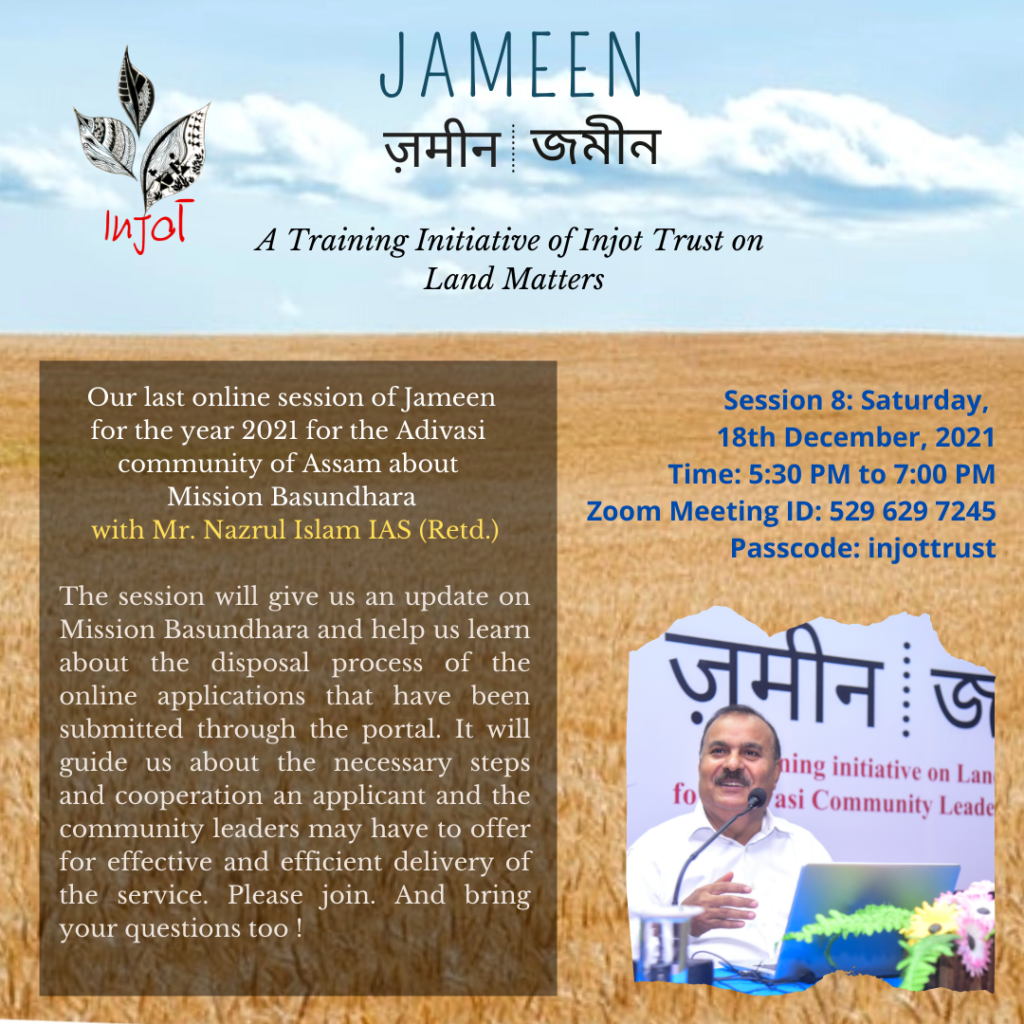


Jameen Online Sessions
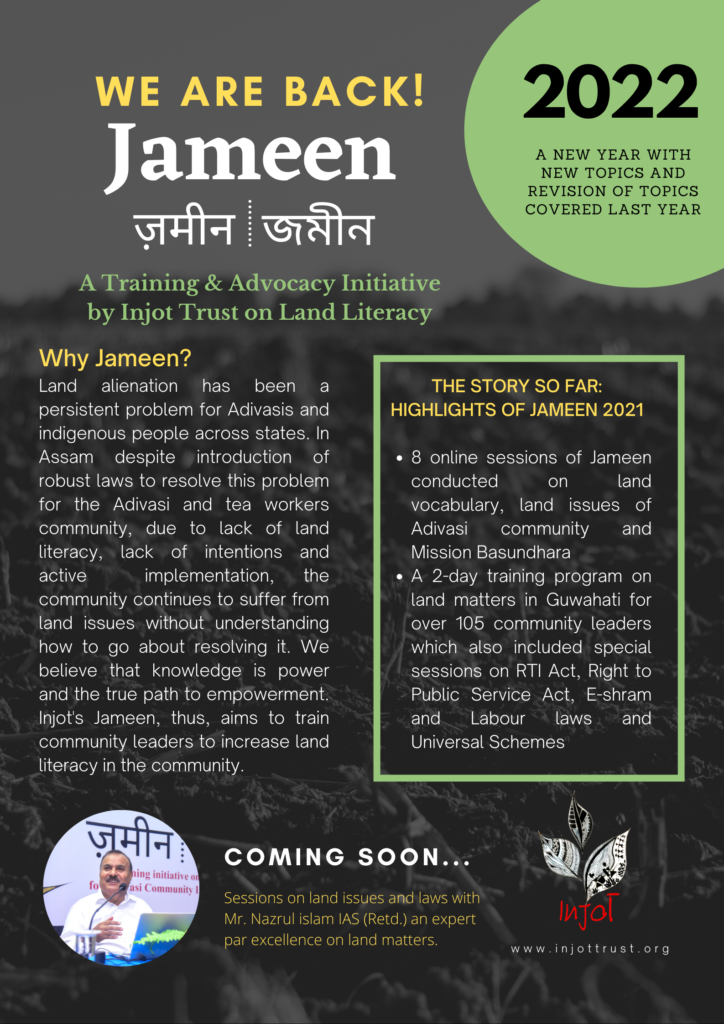
Topics Covered in Eight Online Sessions in 2021:
- Introduction to Land Matters and Overview of Mission Basundhara
- Land Vocabulary and Mission Basundhara
- Mission Basundhara – familiarisation of portal
- Review of land vocabulary and hands-on practice of Basundhara portal
- Hands-on practice of Basundhara Portal and Dharitree App
Topics Covered in 2022 So Far:
- Recap of Core Concepts of Land Literacy
- Understanding of Ceiling Surplus Land and Forest Land
- The Assam Assessment of Revenue Free Wasteland Grants Act 1948
- The Assam Fixation of Ceiling on Land Holdings Act 1956 and Fixation of Ceiling on Land Holdings ( Amendment) Act 1970
- Assam Tenancy Act 1971
Jameen Training Conference: Highlights of 2021
Leaders of Adivasi community – both presently working actively in the field, and future leaders who would like to work with the community were invited to be a part of this training conference held in Guwahati. Organisations and individuals registered for this two day event and participated with enthusiasm. We had over 105 attendees apart from Injot volunteers and facilitators team who had come from different districts of Assam.
Why Work with Community Leaders?
We understand that it is not possible for a single organisation to reach out to each and every community member. At the same time land matters and processes are exhaustive and complex and require in-depth understanding. By engaging with and training community leaders, we feel the outreach of the program will be much wider and faster. It is also necessary to understand that while there are laws that support the Adivasi community and members of the tea community to secure and own land, it is observed that due to ignorance, lack of information, corruption and red-tape, land grabbing, land mismanagement, and cheating in purchase and sale of land are rampant. And thus, the issue of land alienation continues to haunt the Adivasi community in Assam. By working with community leaders, the information dissemination can become widespread, transparent and more effective at the ground level. At the same time, if the information regarding land matters gets disseminated to the community through trusted leaders, we go one step closer to the empowerment of the community members in land matters. Most of the community leaders went to their field/district, and provided assistance and further guidance to a large group of people.
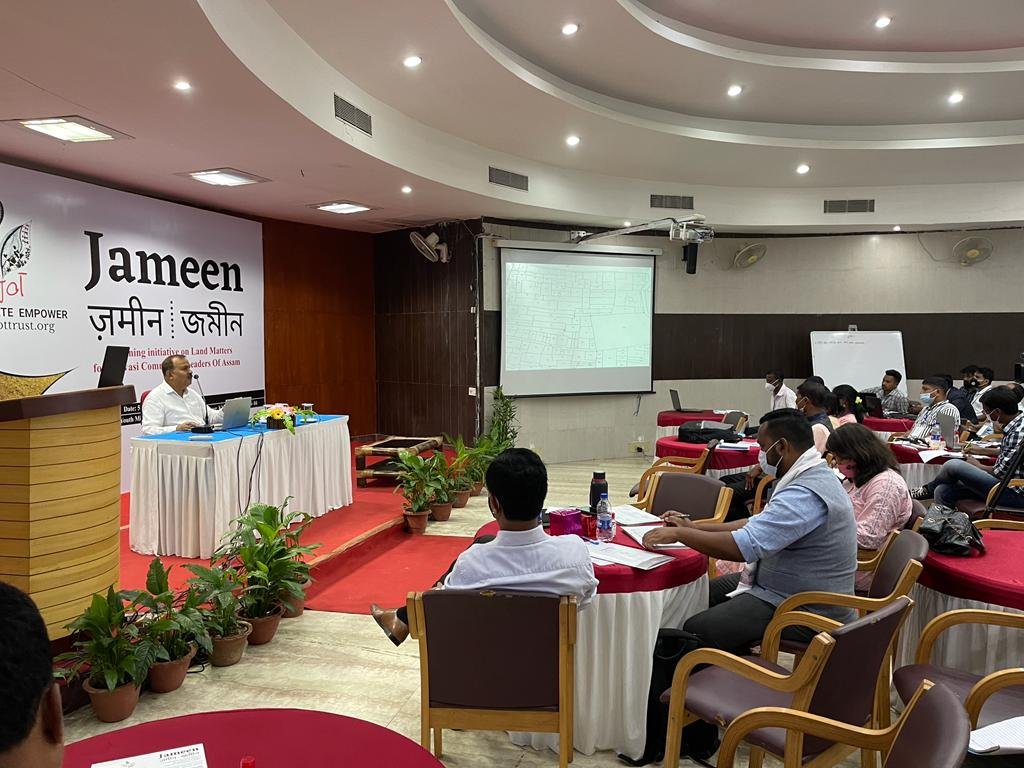




Understanding Major Challenges of Adivasi Community of Assam in Land Matters
Key Areas Discussed:
- Lack of Information and knowledge regarding land matters
- Non-availability of land documents/damage or loss of documents
- Absence of Namjari, mutation and partition of land
- Conversion of annual patta to periodic patta
- Payment of land revenue and Touzi revenue
- Possession of land without proper documents
- No safety net – land the only resource to sell at times of crisis
- Sale and purchase of land with katcha documents
- Risk pooling not common at both individual and community level
Basics of Land Records and Land Vocabulary
Key Points Discussed:
- Essential Vocabulary – cadestal map, chitha, jamabandi, patta, aksoniya patta, miyadi patta, namjari, (mutation), ceiling surplus land, khas land, khatiyan number, daag number etc.
- How surveys are done?
- Provisions of allotment and settlement of government land for ordinary cultivation in rural area
- How to get settlement/patta?
Dharitree App and Basundhara Portals
Key Points Discussed:
- How to check land documents in Dharitree
- How to download jamabandi
- Various services provided through Basundhara portal and how to avail those services
- Processes and hands-on practice
ADDITIONAL SESSIONS CONDUCTED DURING JAMEEN CONFERENCE 2021




Right to Public Service Act with Mr. Nazrul Islam IAS (Retd)
A special session was organised to introduce the Right to Public Service Act to the community leaders and explain how this Act can be used to seek accountability and transparency from public offices. The Assam Right to Public Service Act, 2012 is an act to provide for the delivery of notified public services to the people of the state of Assam within the stipulated time limit.
Universal Schemes with Dr. J B Ekka IAS
A detailed information about various Universal Schemes that all citizens can avail was provided during this session. It gave the participants a macro view of all schemes and how they can be integrated. Dr. Ekka also emphasised on people’s right to these schemes and importance of building awareness amongst community members who are less privileged and live in remote areas.
Right to Information Act 2005 with Mr. Anupchand Minj
The session focused on purpose of the RTI Act, the process of filing and how it can become a crucial tool in the arena of social justice and bringing about transparency in public services. Information about exemptions, the RTI machinery and hierarchies, role of RTI in land records and various departments where land related RTI can be filed we shared. ,
Labour Laws and e-Shram with Mr. Shammi J. Tigga, CLS
The session focused on labour laws and the role of the Labour Department along with a familiarisation of the e-Shram portal and its objectives. The eSHRAM portal has been introduced to register and create a National Database of Unorganized Workers (NDUW), The registration will help the Govt extend the benefits of the social security schemes to the registered worker from the unorganised sector. Ration card portability ( One Nation One Ration Card) was also highlighted.
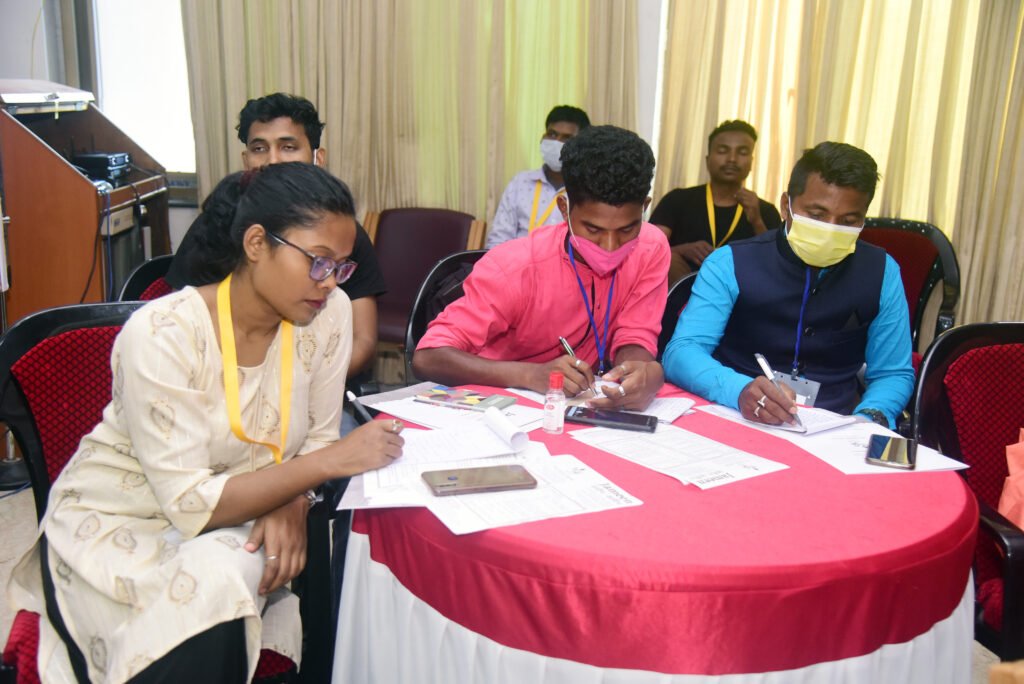
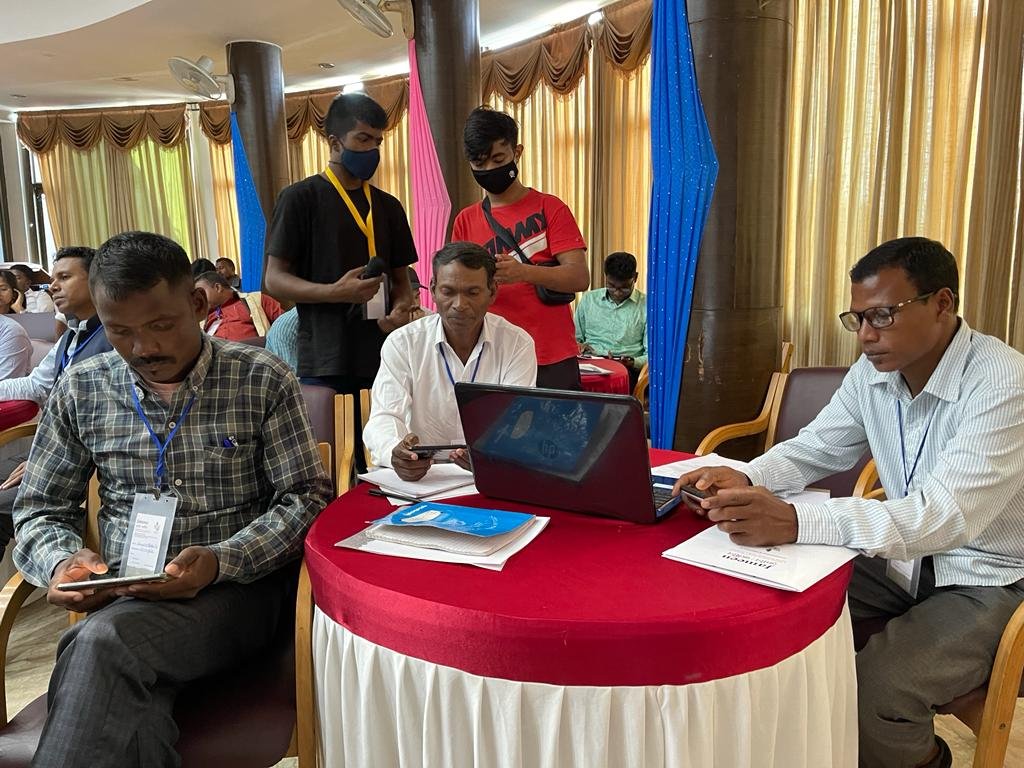
“The biggest challenges that grapple our community are lack of awareness, Illiteracy and poverty, which lead to exploitation…Adivasis don’t get access to the government schemes, simply because our less privileged members are simply not aware. Jameen thought me about land rights, how to do mutation, how to use Dharitree app, how to get lands matters settled online. I also learned how to file RTI, got information about different government schemes for Adivasis and labor laws. We will now organise an awareness camp and will try to pass on the knowledge to different community leaders and members. Moreover, I will, at an individual level support people in their land documentation using the web portals like Basundhara and apps like Dharitree.”
Rev. Benhur S. Soren from Udalguri, Jameen participant
